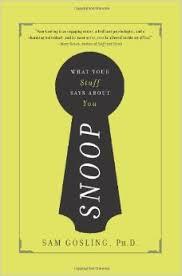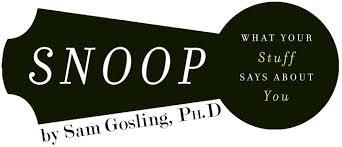Did you know that young males with organized college dorm rooms that have a sports décor tend to be conservative? Or that liberals are more likely to have messy rooms? Or that displaying inspirational posters sometimes signals neurotic tendencies?
 Those are just some of Sam Gosling's fascinating findings. He's an academic snoop and proud of it. He doesn't need data mine spying to uncover some of our behaviors and beliefs. Instead, he observes how we reveal ourselves by how and what we display in our homes, offices and cars.
Those are just some of Sam Gosling's fascinating findings. He's an academic snoop and proud of it. He doesn't need data mine spying to uncover some of our behaviors and beliefs. Instead, he observes how we reveal ourselves by how and what we display in our homes, offices and cars.
Do Others See You as You See Yourself?
We see some things about ourselves very clearly, such as recognizing our level of optimism, pessimism and self-esteem. Yet, we are biased by our craving to be liked. Thus we're heavily invested in believing in our traits such as intelligence, attractiveness, body language so they become our blind spots. That's one of the reasons why it is helpful to recognize our personality traits by what we display, according to Gosling. We send mixed signals, in what we display and do, thus causing misunderstanding and friction. He join forces with other Psychsters to offers the YouJustGetMe app for free. Use it to explore the "bright spots", "dark spots" and "blind spots" in your relationships with others.
What are you inadvertently revealing?
We often reveal aspects of our personality traits by what we display, according to Gosling. From the pet you choose, to where you sit in a group, to the clothes you wear, you are constantly revealing your personality, what you most value, how you feel about yourself and others, how you view the world and even how you want to be treated.
• Dog owners, for example, rank higher in agreeableness, conscientiousness and extraversion than cat owners but lower in openness and neuroticism. Dog owners: Is your pet's personality compatible with yours?
• You are showing whether you are more extroverted or introverted.
• "Your desk is actually a window into your personality," says Gosling. "An empty desk often indicates dissatisfaction with or a lack of dedication to a job. An overgrown fern says a worker is there to stay. Every single element, every item, got here somehow."
How Do You Mark Your Territory?
I've summarized some of Gosling's other clues:
• Identity Claim
Like rolling down your car window when your radio is on, you are sharing statements of who you are. The self-directed identity claim is a deliberate statement by a person to express his/her personality. For example, Gosling said, an American flag mouse pad expresses a person's strong desire to be seen as patriotic, often for underlying reasons.
• Behavior Residue
Some actions leave a trace in the environment. Gosling says if your desk is neat or cluttered, it may say: "I'm trying to have some organization," or "I feel too busy to put things back in order."
• Thought and Feeling Regulators
Yes many men need their caves. We instinctively construct spaces for comfort, to regulate our feelings. For example, some may play music to help them focus, or put a living plant on the desk to see beauty. We all have the profound desire to be seen and understood.
Digital Living Makes Our Markers More Invisible
Bookshelves? Music tapes? Increasingly more of the telltale clues are no longer in our physical world, but online and accessible online and in-hand via our smart devices. We display fewer traces of our personality. "Our true selves are increasingly retreating from public display and disappearing inside our devices," observes New York Times columnist Bruce Feiler.
Get a Fresh Look at Your Stuff to Discover More
With Gosling's guidance, Jeff Potter provides the updated test you can take for free. Gosling's remarkably disparate research on behavior and territory has been cited by David M. Buss in The Murderer Next Door: Why the Mind Is Designed to Kill, Malcolm Gladwell in Blink, and Annie Murphy Paul in The Cult of Personality. Like to discover more about the ways our everyday environments (bedrooms, medicine cabinets, offices, cars, etc.) betray our personalities? Read How to be a Successful Snoop.



